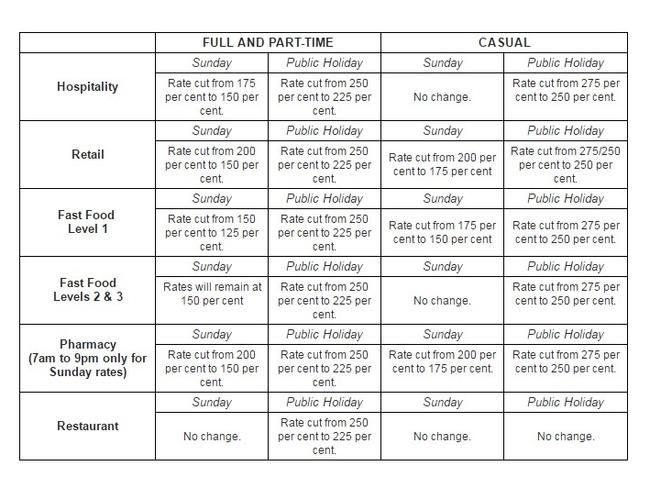What to do if your pay is cut
EMPLOYEES are being warned to check their pay slips carefully. If the changes to Sunday penalty rates affect you, here’s what you should do next.
At Work
Don't miss out on the headlines from At Work. Followed categories will be added to My News.
EMPLOYEES are being warned to check their pay slips carefully over the next few months to make sure their Sunday and public holiday penalty rates are not being reduced.
The Fair Work Commission on Thursday announced cuts of 25 to 50 per cent to penalty rates for workers in the hospitality, fast food, restaurant, retail and pharmacy industries.
But the changes do not come into effect right away.
For Sunday penalty rates, the FWC has proposed for the reductions to take place in a series of annual adjustments — most likely two — from 1 July 2017. For public holiday rates, the cuts will take effect on 1 July 2017.
Slight changes to start and finish times for early and late-night work loadings for restaurant and fast-food workers will also come into effect in late March 2017.

Slater and Gordon principal employment lawyer Aron Neilson said workers should pay close attention to their pay slips in the meantime. “There is already strong opposition to this decision and potential appeals are likely, so employees should be keeping a close eye on their pay packets,” Mr Neilson said.
“At this stage, public holiday penalty rate cuts are not due to come into force until 1 July 2017, but that is pending any appeals or variations. The time frame is much more unclear for Sunday penalty rate cuts, with staggered annual reductions over at least two years proposed to begin on 1 July 2017, but this matter is expected to be heard in court in early May 2017.
“Workers should look up their award and check their current penalty rates against the calculations on their pay slip. If they don’t match, workers should raise it with their boss.”
Mr Neilson said it could be “incredibly intimidating to stand up to an employer and ask them to do the right thing, especially when the issue relates to money”.
“Employees should remember that it is a breach of the Fair Work Act for an employer to sack you or stop rostering you for shifts because you raised a concern about your wages,” he said.
“It is even illegal for your boss to threaten to take any of these steps, so if you think you’re not being paid all of your entitlements or you’re being treated unfairly, it’s important to raise the matter with your union or get legal advice so you’re not on your own.”
Shine Lawyers workplace law principal Sarah lock also warned employers not to jump the gun. “Australian workers should be checking their pay slips closely in the coming months to avoid becoming victims of wage exploitation over the planned Sunday penalty change,” Ms Lock said.
“With the 7-Eleven underpayment scandal and other recent stories of exploitation of low paid and foreign workers, we have seen how ruthless business owners can be when it comes to trimming their wage bills. We are concerned some employers might try to jump the gun on these changes to the detriment of workers.
“Businesses should also be reminded that if they are caught changing penalty rates ahead of time, they will be liable for back pay on those missed penalties as well as interest and will face federal fines.”
Ms Lock said the losers would “clearly be the casual employees”, in particular students “trying to put themselves through college or university with minimal government assistance or relying on their families to get them through”.
“Unfortunately they attend their studies during the week leaving them limited opportunity and hours to work to pay for their living expenses,” she said. “This will be another blow to their earning capacity.”
Maurice Blackburn employment law principal Josh Bornstein on Thursday said the proposed cuts to penalty rates would leave thousands of Australians worse off and the impacts for lower-paid workers in particular would be significant.
“Already in Australia workers are experiencing record low wage growth, and today’s decision to cut Sunday and holiday penalty rates for some of the country’s lowest-paid workers is likely to exacerbate the growing economic problems of wage inequality, insufficient tax revenue and sluggish demand,” Mr Bornstein said.
“There are regular reports of the lowest paid workers in the country being forced onto sham contracts or being underpaid through other precarious work arrangements. Today’s decision will further disappoint these workers.
“The increasing gap in wage equality is not just an issue in Australia — it is damaging economies throughout the world. The Federal Government has been missing in action on this debate, happy to allow the country to sleepwalk further into a two class economy when now, more than ever, we need action and leadership to address wage inequality.
“Maurice Blackburn stands with the union movement in supporting better outcomes for all working Australians and more enlightened government policy.”
McDonald Murholme managing director Alan McDonald said the decision to cut penalty rates made it “transparent” that the FWC was about protecting employers, not employees.
“One hundred years ago when it was founded the arbitration commission was very much about protecting everyday Australians’ standard of living,” Mr McDonald said.
“When business is bigger and stronger than it’s ever been, it is curious that the Fair Work Commission favoured business over Australian workers and shows no sense of history.
“It has clearly broken with the early legal precedents where a ‘living wage’ for workers was considered more important than business profit. Perhaps the Fair Work Commission should be put in charge of electricity and water costs so that it can now reduce these as well.”
Originally published as What to do if your pay is cut



